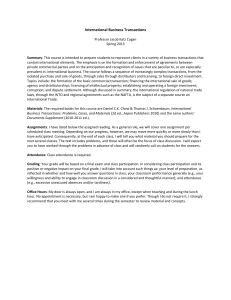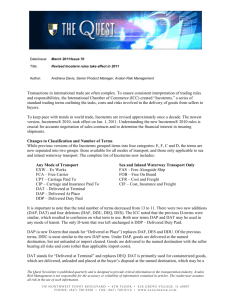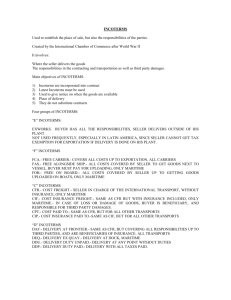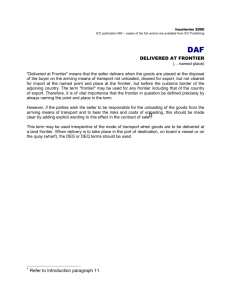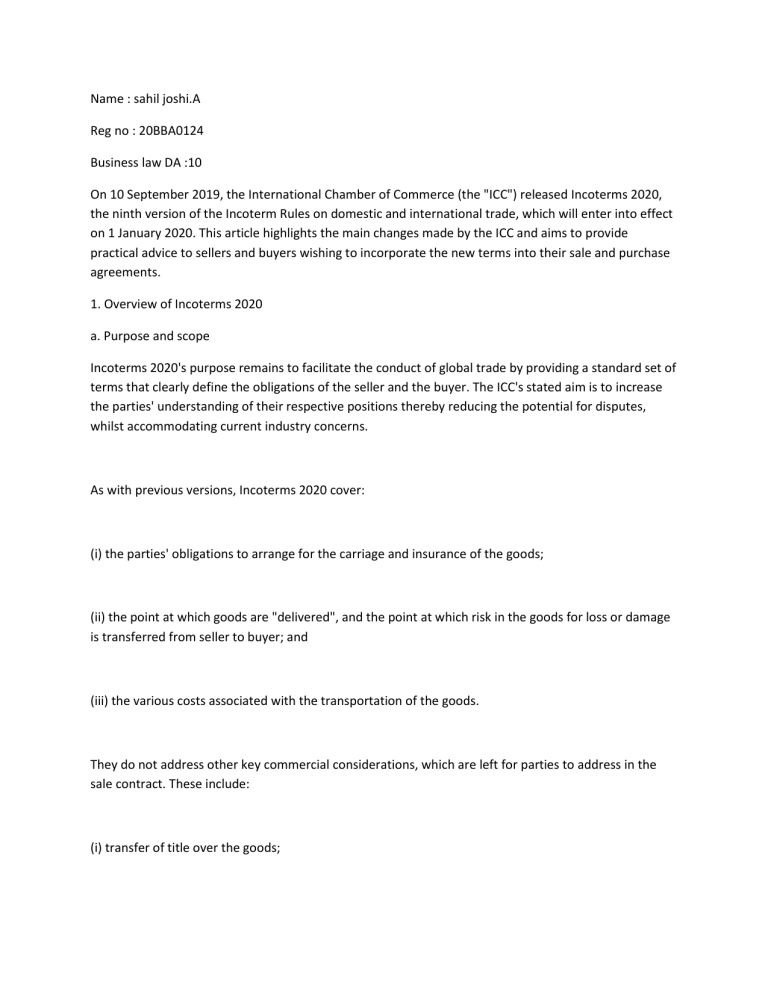
Name : sahil joshi.A Reg no : 20BBA0124 Business law DA :10 On 10 September 2019, the International Chamber of Commerce (the "ICC") released Incoterms 2020, the ninth version of the Incoterm Rules on domestic and international trade, which will enter into effect on 1 January 2020. This article highlights the main changes made by the ICC and aims to provide practical advice to sellers and buyers wishing to incorporate the new terms into their sale and purchase agreements. 1. Overview of Incoterms 2020 a. Purpose and scope Incoterms 2020's purpose remains to facilitate the conduct of global trade by providing a standard set of terms that clearly define the obligations of the seller and the buyer. The ICC's stated aim is to increase the parties' understanding of their respective positions thereby reducing the potential for disputes, whilst accommodating current industry concerns. As with previous versions, Incoterms 2020 cover: (i) the parties' obligations to arrange for the carriage and insurance of the goods; (ii) the point at which goods are "delivered", and the point at which risk in the goods for loss or damage is transferred from seller to buyer; and (iii) the various costs associated with the transportation of the goods. They do not address other key commercial considerations, which are left for parties to address in the sale contract. These include: (i) transfer of title over the goods; (ii) contractual payment terms (distinct from costs associated with transportation of the goods); (iii) consequences for breach of performance; (iv) sanctions; (v) governing law and jurisdiction; (vi) dispute resolution; and (vii) regulatory obligations, e.g. the shippers' obligation to record containers' verified gross mass (VGM), under Regulation 2 of SOLAS. b. Legal effect Incoterms 2020 per se are not legally binding, unless they are incorporated into an agreement by express reference to the specific Incoterm. The ICC suggests the following template for incorporation: "[the chosen Incoterms rule] [named port, place or point] Incoterms® 2020" e.g. CIF Shanghai Incoterms® 2020; DAP 1 High Street, City of Delivery, Country of Delivery Incoterms® 2020 When adopting the above formulation, parties should note the following: (i) It is not necessary to use the trademark symbol but it is essential to state the version of Incoterms used, otherwise a dispute could arise as to the correct version and lead to a different outcome to that intended. (ii) Parties must insert the correct "named port, place or point", which may refer to the place of delivery, the place of destination or both, depending on the Incoterm chosen. To avoid confusion, parties should always consult article A2 ("Delivery") of the appropriate section of Incoterms 2020. (iii) Incorporation of an Incoterm 2020 into a sale contract will not bind any third party, or govern any other contract; it is for the seller and / or the buyer alone to ensure that any contract of carriage, insurance contract or letter of credit entered into, corresponds with the Incoterm they have agreed. 2. Differences between Incoterms 2010 and Incoterms 2020 a. Substantive changes to Incoterms 2020 The ICC has made the following substantive changes to the parties' obligations in response to industry concerns: (i) Bills of Lading with an on-board notation (FCA - Free Carrier) Articles A6/B6 ("Delivery/transport document") of the FCA Incoterm now provide that, where agreed, the buyer may instruct the carrier to issue to the seller (at the buyer's cost and risk), an on-board bill of lading stating that the goods have been loaded. As delivery under the FCA Incoterm occurs either at the seller's premises, or when the goods are placed at the carrier's disposal at the named place of delivery, it may not have been possible, under the previous version, for the seller to obtain an on-board bill of lading where this was required as a condition of payment. This amendment seeks to resolve this issue. (ii) Costs (articles A9/B9) In a further attempt to increase transparency and to enable a comparative understanding of the parties' cost obligations, the new costs articles A9/B9 – previously A6/B6 – collate under a single heading all of the parties' respective costs obligations. (iii) Insurance cover (CIP - Carriage and Insurance Paid to) As well as the reallocation of all insurance obligations from former articles A3/B3 to new articles A5/B5, the default minimum level of insurance cover required under the CIP Incoterm has increased, from Institute Cargo Clauses (C), to Institute Cargo Clauses (A). Under Incoterms 2010, both CIF and CIP Incoterms required the seller to procure insurance cover which conformed with Institute Cargo Clauses (C) as a minimum, which covers certain limited listed risks, subject to listed exclusions. Institute Cargo Clauses (A) is by comparison an "all risks" cover but subject again to listed exclusions. The amendment reflects a better understanding of the types of goods commonly transported under the two Incoterms: while CIF is a Maritime Rule, used predominantly for maritime commodity trades, CIP is a Multi-Modal Rule, more commonly used in the sale of high-value, manufactured goods. Sellers will therefore need to factor in the increased cost of the additional insurance premium that is required under CIP. (iv) Carriage by seller’s/buyer’s own means of transport (FCA, DAP, DPU and DDP) Under the FCA, DAP, DAT (now DPU) and DDP Incoterms 2010, the party under the obligation to arrange carriage was required to contract with a third party carrier. The wording of new articles A4/B4 for these Incoterms now provides the party so obliged with the additional option to make other arrangements, i.e. non-contractual, for the carriage at its own cost. This amendment again seeks to recognise the commercial reality that sellers and buyers often use their own methods/resources to transport the goods. (v) "Delivered At Terminal" (DAT) replaced by "Delivered at Place Unloaded" (DPU) To better distinguish Incoterms 2010 DAT ("Delivered at Terminal") and DAP ("Delivered at Place"), DAT is renamed DPU ("Delivered at Place Unloaded") under Incoterms 2020. DAP now also appears before DPU in the text to reflect the fact that delivery under DAP occurs before delivery under DPU. Under DAP, the goods are deemed delivered when placed at the buyer's disposal from the means of transport, whereas under DPU, goods are deemed delivered upon unloading at the agreed point. Additionally (unlike DAT), delivery under DPU is no longer limited to delivery at a terminal. (vi) Security-related requirements in respect of all Incoterms In recognition of the increase in security-related concerns in the trade and shipping sectors over the past decade, article A4 ("Carriage") of each Incoterm now requires the seller, where applicable, to comply with any transport-related security requirements, up to the point of delivery, and/or to provide the buyer, at the buyer's request, risk and cost, with any information concerning transport-related security requirements, that the buyer needs for arranging carriage. Article A7 ("Export/Import Clearance") of each Incoterm, where applicable, now also expressly requires the seller to carry out any security-related export clearance formalities and/or assist the buyer to obtain any documents, or information necessary, for complying with import or transit security-related clearance formalities. Transport-related security costs have also been given greater prominence in the stand-alone list of costs obligations under articles A9/B9 of each Incoterm. Parties should note that the references to "security" in Incoterms 2020 are general; no specific reference is made to cyber security or other forms of security as might have been expected. Parties will need to specifically address this issue if they wish to include it in their contractual arrangements. b. Changes to lay out in Incoterms 2020 Structurally, Incoterms 2020 appear much the same as the previous version: eleven three-letter acronyms, ranging from "EXW" (Ex-Works) to "DDP" (Delivered Duty Paid), which continue to be split between: (i) Terms for any Mode or Modes of Transport (namely EXW, FCA, CPT, CIP, DAP, DPU – previously DAT – and DDP) (the "Multi-Modal Rules"); and (ii) Terms for Sea and Inland Waterway Transport (namely FAS, FOB, CFR and CIF) (the "Maritime Rules"). Each individual Incoterm contains two sections of ten articles; section "A" stipulates the seller's obligations and section "B", the buyer's. However, the ICC's attempt to make Incoterms 2020 more transparent is evidenced by the following changes: (i) The “Guidance Notes” contained in Incoterms 2010 are renamed “Explanatory Notes for Users” and feature at the beginning of each Incoterm. Illustrations and more detailed key features have been added. (ii) The A/B articles have been reordered, and now prioritise Delivery (A2/B2) and Transfer of Risks (A3/B3); and (iii) In addition, the text is structured so that users can also look up the parties' respective obligations (e.g. concerning Delivery) for each Incoterm thus enabling users to compare the parties' respective responsibilities (for example under CFR and CIF)
